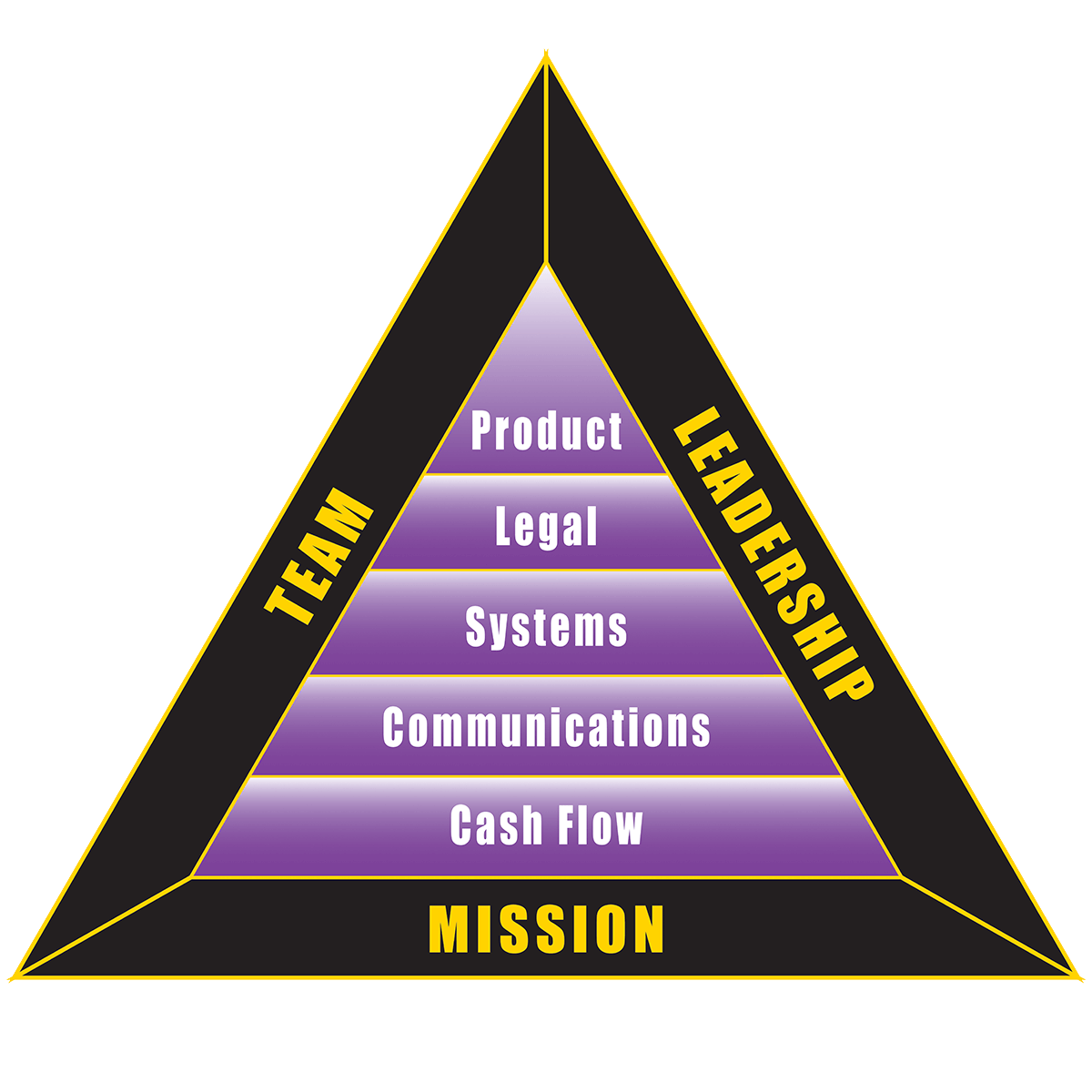In a blog about the importance of systems to the success of a business, Robert Kiyosaki wrote:
A business is a complex system of interoperating systems. And like a body, if one of those systems fails, the whole business will either be crippled or die. The B-I Triangle visually represents many of these systems. They are all separate but also all linked together. It is difficult to separate the systems because they are interdependent, and it is also difficult to say that one is more important than the other.
Just as important to the success of a company as the systems it employs, is the leader that makes sure those systems run at peak performance—and that the right systems are in place. That leader is the company’s CEO.
In this blog, we’ll discuss the vital role of the CEO from the perspective of what we at Rich Dad learned from Apple’s Top Entrepreneur: Steve Jobs.
But as an entrepreneur, Steve Jobs didn’t just make a great product.
A CEO’s main job
In many ways, Steve Jobs exemplified what The Rich Dad Company has taught about business for many years. He was a great leader and visionary. And he was a great example of what a business owner should look like.
A CEO’s job is to supervise all systems and identify weaknesses before they turn into system failures. These failures can happen in many different ways, but they are exceptionally disconcerting when your company is growing rapidly.
Many CEO’s find it surprising that when everything is finally going right—their sales are increasing, their product or service is getting the attention it deserves from the media, and things are growing fast—they suddenly can’t deliver. Why?
Why systems fail
Usually, it is because systems have failed from the increased demand. For instance, you don’t have enough production capacity or the extra money needed to improve the product or hire additional help.
Whatever the reason, opportunities are missed to move the business to the next level of success, all due to a failure in systems.
Building ahead of the curve
At each new level of growth, the CEO must start planning the systems needed to support the next level of growth, from production lines to lines of credit for production needs. Systems drive both cash-flow management and communication. As your systems get better, you or your employees will have to exert less and less effort. Without well-designed and successful operating systems, your business will be labor-intensive, and will stall at one or more growth phases.
Steve Jobs and the B-I Triangle
One tool used at Rich Dad is the B-I Triangle. The B-I Triangle is simply a matrix for understanding the eight parts that make up a successful business.

Where most people fail when they begin a business is that they think the product is the most important thing. The problem is that there are many businesses that have a great product, and yet they fail. Whenever a business is struggling, the B-I Triangle is a useful tool to diagnose what is wrong with that company.
When you look at the B-I Triangle, you’ll notice that product is the smallest part of the triangle. This is because it’s the least important part of a company. Having a great product is not the starting point; it’s the end point. Before you have a great product, you must first have a great mission, a great team, and a great leader.
Steve Jobs understood this fundamental concept better than most, and by applying it, he created a company that changed the world. Let’s take a look at the three outer concepts of the B-I Triangle and see why they made Steve Jobs and Apple so successful.
Establish a spiritual mission
It’s important that every business has a spiritual mission.
“The mission of a business should fill a need for your customers,” said rich dad. “And if it fills that need, and fills it well, the business will begin to make money.”
Although a spiritual mission does not drive many companies, it is ultimately critical for their long-term success.
Apple doesn’t list an official mission statement, most people would agree that the mission of Apple could be summed up in a simple statement: Think Differently.
Many companies use their mission statement to explain what they do, not why they do it. So a competitor to Apple might say something like, “We make great computers.” Conversely, Apple says, “We think differently and want to fundamentally change the way you interact with technology. And we happen to make great computers.”
Apple didn’t start with a product. They started with a mission and then created a great product.
Jobs was clear on the power of a spiritual mission in a company, and served as its face in his presence at Apple, and the manner in which he viewed Apple’s operations.
“It is in Apple’s DNA that technology alone is not enough,” he said, “it’s technology married with liberal arts, married with the humanities, that yields us the results that make our heart sing.”
Build a strong team
If you want to be a successful businessperson, you must learn how to be a successful CEO. That starts with understanding that your #1 job is to work on the business, not in it. That means you must become a master of systems, managing them and knowing when to implement new ones.
It also means that you develop a team that can execute with the same commitment level as you, the CEO.
Apple hires only the best in the world to work for them – and they hire only people who are on board with their mission. They create a culture where brilliant and committed people can thrive. Steve Jobs, while a visionary leader and the heart and soul of Apple, understood the importance of building a great team and allowing them to work hard and own a part of his vision.
Many leaders have a hard time letting go. They don’t trust people to help them succeed. So, they push people away by not empowering them. Steve Jobs did the exact opposite. He created a culture of innovation by focusing his team on two things, encouraging debate in development and making his teams cross-disciplined. He understood he couldn’t succeed alone.
Display excellent executive leadership
And of course, Steve Jobs was a great leader. You’ll find countless stories describing his outstanding leadership, but this simple story related by Bill Lee in the Harvard Business Review shows you how great he was:
Jobs is supposedly obsessed with every detail that goes into Apple devices. Not so. He focuses on the details relevant to the customer’s experience. When one of Apple’s design teams was tasked with developing a DVD-burning software program for high-end Macs, developers spent weeks putting together a plan. On the appointed day to present it to Jobs, they brought pages filled with prototype information, pictures of the new program’s various windows and menu options, along with documentation showing how the application would work. When Jobs walked into the meeting, he didn’t so much as look at any of the plans. He picked up a marker, went to a whiteboard and drew a rectangle, representing the application. He then told them what he wanted the new application to do. The user would drag the video into the window, a button would appear that said “burn,” and the user would click it. “That’s it, that’s what we’re going to make,” he said.
Steve Jobs was a brilliant leader and entrepreneur because he reminded his team that Apple existed to think differently. It was not Apple’s products that made them great. It wasn’t how they created those products that made them great. It was why they created those products that made them great.
Despite being a college dropout, he built the most profitable company in the world – a company with more cash than the U.S. government. He didn’t work in the system. He defied it.
Today, learn the lesson from Steve. Start thinking about why you do what you do, who you want to do it with, and lead those people to your promised land. The best way to gain this kind of expertise is through experience. Do it, and you’ll get better at it. Sure, you’ll fail along the way, but the lessons you’ll learn will make you that much better down the road.
For help pursuing your business dreams and to learn more about becoming an exceptional CEO, check out our online community here.






